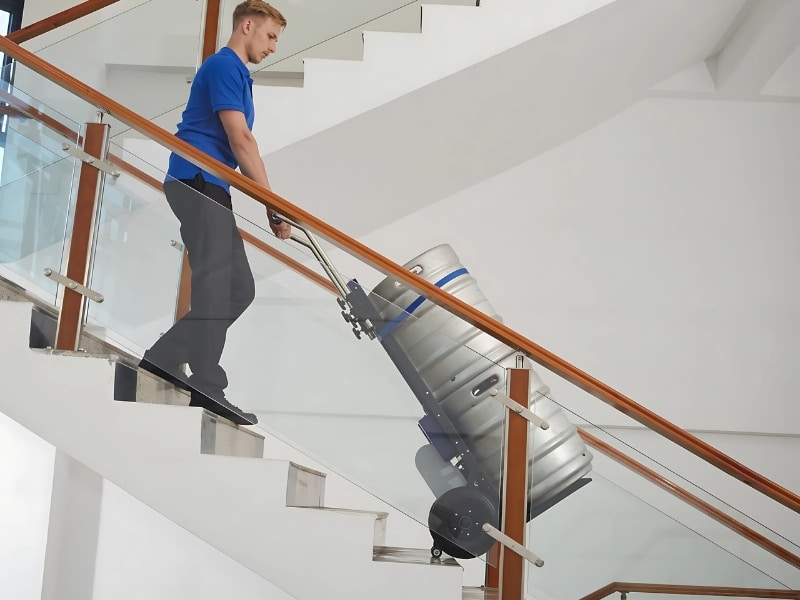Hand trolleys are essential tools in many workplaces and households, making it easier to transport heavy items. However, like any piece of equipment, improper use can lead to accidents, injuries, and long-term health problems. Understanding and implementing proper hand trolley safety precautions is crucial to prevent harm and ensure the equipment’s efficiency and durability. This article will explore the importance of these precautions and why they should always be a top priority.
What Are the Risks of Ignoring Hand Trolley Safety?
Ignoring hand trolley safety precautions can lead to accidents and serious injuries, affecting both the user and those nearby. Common risks include falls, strain, pinched fingers, and damage to surroundings.
- Musculoskeletal injuries: Lifting heavy loads incorrectly can strain your back, shoulders, and knees.
- Slips and falls: Improper handling of the trolley can cause you to lose balance and fall.
- Dropped loads: Heavy items could fall and injure someone if a trolley is overloaded or poorly balanced.
- Equipment damage: Misuse of the trolley can lead to breakdowns or damage to the transported items.
By understanding these risks and implementing the proper precautions, workers and individuals can minimise the potential dangers of hand trolley use.
How Can Improper Hand Trolley Use Lead to Workplace Injuries?
Misusing a hand trolley can cause injuries from minor to severe. Common causes include improper handling, overloading, and not following safety protocols.
- Overloading the trolley: Trying to carry too much weight on a hand trolley can result in loss of control or tipping.
- Rushing while using the trolley: Moving too quickly can cause a loss of balance or misdirected loads.
- Incorrect posture: Lifting or pulling a trolley in an awkward position can strain your back and joints, leading to serious injuries.
- Using a faulty trolley: A trolley with damaged wheels or handles can lead to accidents or equipment failure.
- Improper braking on slopes: Failing to secure the trolley when navigating stairs or inclines can cause uncontrolled movement.
Using a hand trolley correctly can significantly reduce the likelihood of these injuries.
Can You Use a Hand Trolley for Every Job?
When using a hand trolley, various factors must be considered to determine whether it’s the right tool for the job. Here’s a table summarising key considerations for safe and effective trolley use.
Factor | Consideration |
Size and weight of the load | Larger or heavier items may need specialized trolleys or lifting equipment. |
Distance and terrain | Trolleys are best for short distances on smooth surfaces; rough terrain is challenging. |
Types of stairs or obstacles | Some trolleys are stair-friendly, while others may struggle with steps. |
Space constraints | Trolleys may not fit in narrow aisles or doorways. |
Frequency of use | Frequent use may require a stair climber or powered trolley for efficiency. |
Using the right equipment for the job ensures efficiency and safety, preventing the risk of accidents.
Which Common Mistakes Should Be Avoided When Using a Hand Trolley?
Certain mistakes can compromise the effectiveness and safety of using a hand trolley. Here are some common errors that should be avoided:
- Overloading the trolley: Exceeding the weight limit can cause the trolley to tip over or break.
- Improper grip: Not holding the trolley properly can lead to loss of control, especially on inclines or uneven surfaces.
- Ignoring safety features: Not using safety features, like brakes or stabilising mechanisms, increases the risk of accidents.
- Using the wrong trolley type: A general-purpose trolley may not safely handle heavy warehouse tasks. A hand trolley suitable for warehouse use ensures better stability and efficiency.
Avoiding these mistakes can help you get the most out of your hand trolley while keeping yourself and others safe.
Why Is Load Distribution Crucial for Safety?
Correct load distribution is crucial for safety when using a hand trolley. Uneven loads can cause tipping, leading to accidents. Key aspects to consider include:
- Centre of gravity: Always ensure the weight is centred and evenly distributed across the trolley.
- Securing the load: Make sure the load is properly secured and won’t shift during transport.
- Balance: Keep the load balanced, with heavier items positioned lower to avoid tipping.
- Stacking properly: If the load consists of multiple items, ensure they’re stacked in a way that won’t cause instability.
By focusing on load distribution, you can prevent accidents and improve the overall efficiency of the task.
Is There a Correct Way to Use a Hand Trolley?
There is a correct way to use a hand trolley; following these methods is important to avoid injury. Here are some tips for safe and effective hand trolley use:
Tip | Explanation |
Bend your knees | Bend your knees, not your back, to avoid strain when lifting or loading. |
Keep a firm grip | Securely hold the handles and keep hands away from wheels or axles. |
Push, don’t pull | Always push the trolley for better control, rather than pulling. |
Use both hands | Use both hands to control the trolley, especially on stairs or rough terrain. |
Stay aware of your surroundings | Ensure the path is clear of obstacles and hazards before moving the trolley. |
Using proper technique ensures that the task is safer and more efficient, reducing the risk of injury.
What Should You Check Before Using a Hand Trolley?
Before using a hand trolley, inspecting the equipment to ensure it’s in good working condition is crucial. Here’s a checklist of things to look for before getting started:
- Check the wheels: Ensure they are in good condition and properly attached.
- Inspect the handles: Make sure the handles are secure and free from cracks or damage.
- Test the brakes: If the trolley has brakes, they function correctly.
- Ensure proper load capacity: Verify that the trolley can handle the weight of the load.
- Look for signs of wear: Inspect the frame and other parts of the trolley for any damage or wear that could affect performance.
A quick inspection before using the trolley can help you spot signs that it’s time to replace your hand trolley, preventing the use of faulty equipment that could lead to accidents or injuries.
Can Hand Trolleys Be Used for All Types of Loads?
While hand trolleys are incredibly useful, they aren’t designed for all types of loads. Specific loads may require specialised equipment to transport safely. Here’s what to consider:
- Sharp or dangerous objects: Hand trolleys may not be ideal for transporting items with sharp edges or hazardous materials.
- Delicate items: To avoid damage, trolleys are best designed for moving fragile objects.
- Irregular shapes: Items that aren’t uniform in shape may need additional support or a different kind of trolley for secure transport.
Hand trolleys from trusted providers are perfect for handling various loads, but it’s important to consider the nature of the load to ensure it’s the right tool for the job.
Conclusion
Proper hand trolley safety precautions are essential for preventing injuries, protecting equipment, and improving productivity. You can minimise risks and increase efficiency by using the right trolley for the job, distributing the load correctly, and following best practices. Remember, safety should always come first when using any equipment.
If you’re looking for high-quality trolleys that enhance safety and efficiency, Reach out to Stair Climbers for all your heavy lifting needs.


